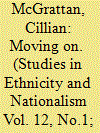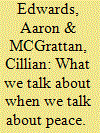| Srl | Item |
| 1 |
ID:
181038


|
|
|
|
|
| Summary/Abstract |
Ireland’s ‘decade of centenaries’ means different things to different people.1 On the one hand, for Irish nationalists in Northern Ireland and the Republic,2 the term refers to the period bookended by the second reading of the Home Rule Bill in May 1912, which promised a degree of self-government for the island, and the ending of the Irish Civil War in May 1923. On the other hand, for Ulster unionists,3 the September 1911 march against Home Rule represented a mobilization of some 70,000 people that inspired the following year’s ‘Ulster Day’ where over 500,000 men and women signed the Ulster Covenant pledging resistance to Home Rule.
|
|
|
|
|
|
|
|
|
|
|
|
|
|
|
|
| 2 |
ID:
113026


|
|
|
|
|
| Publication |
2012.
|
| Summary/Abstract |
Debates over the direction of the Northern Irish peace process have moved from decommissioning and all-party inclusion to community relations and whether society is becoming more or less integrated and shared. This article contends that what is missing from this debate is consideration of the fact that a process of de-politicisation is occurring - specifically, inspired by a progressivist imperative, political discourse and engagement are increasingly moving from the public sphere to more privatised concerns. I argue that that vision does not speak to the trauma of the past and that the silencings, limitations, and dilemmas it leads to are most lucidly seen in recent Northern Irish drama productions. I conclude by sketching an alternative ethical vision based on an attachment to remembering historical injustices and a repudiation of the social pressure to draw a line under the past.
|
|
|
|
|
|
|
|
|
|
|
|
|
|
|
|
| 3 |
ID:
105989


|
|
|
|
|
| Publication |
2011.
|
| Summary/Abstract |
It has been argued that a key factor in explaining the relative success of the Northern Ireland peace process is the role played by Non-Governmental Organisations (NGOs) and Community-Based Organisations (CBOs) in fostering dialogue and promoting shared space for cooperation across the communal divide. This article critically interrogates the normative import of that narrative, which implies that NGOs and CBOs occupy a higher moral ground than state-sponsored agencies. In large part this is attributed to both their indigenous character and their close proximity to terrorist violence. Indeed, several of these NGOs and CBOs are staffed by individuals who were convicted and imprisoned for terrorist-related offences. This article is less concerned with the actions of these non-state actors than with the political and moral foundations of the "peace consultancy industry," which has grown up around the design, implementation, and ongoing evaluation of these projects. We argue that by importing tautological-and sometimes cynical-understandings of the term "peace," these consultants risk complicity in reproducing the terroristic narratives that inspired and perpetuated the conflict in the first instance.
|
|
|
|
|
|
|
|
|
|
|
|
|
|
|
|
| 4 |
ID:
121897


|
|
|
|
|
| Publication |
2013.
|
| Summary/Abstract |
Kieran McEvoy and Peter Shirlow's response to our article is emblematic of the very tendencies towards the creation of problematic conceptualisations of peace that we had set out to critique. 1 Our article sought to problematise the over-confidence of claims that everything was "settled" and that we must thank terrorists and ex-terrorists for their magnanimous gift of having led us out of the very situation they led us into in the first place, as if peace was a privilege and not a right. We characterised the tendency to overinflate the role of paramilitaries in fostering peace as equivalent to the promotion of what we termed "terroristic narratives"-namely, stories that elided notions of "peace" with terrorists' own self-justifications. We suggested that the political effect of this was to defer recognition of the nationalising impulse behind terrorist campaigns in Northern Ireland-an impulse that remains in the post-hoc appraisals by terrorists of their actions. We suggested that the failure to tackle this could be deleterious for the stated objectives of both the British and Irish governments to cultivate a shared society in Northern Ireland.
|
|
|
|
|
|
|
|
|
|
|
|
|
|
|
|